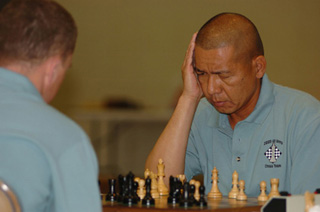
Sergeant concentrates at the All-Army Chess Championship. (Army photo by Tim Hipps. Image courtesy of U.S. Army Web site: http://www.army.mil/.)
Instructor(s)
Prof. James Snyder
MIT Course Number
17.881 / 17.882
As Taught In
Fall 2004
Level
Undergraduate / Graduate
Course Description
Course Features
Course Description
Increasingly, political scientists are using game theory to analyze strategic interactions across many different settings. Each of the sub-fields, to differing degrees, has seen game theoretic concepts enter its vocabulary, and students entering the profession will need to understand the potential and limits of game theory. This course aims to give students an entry-level understanding of the basic concepts of game theory, and how these concepts have been applied to the study of political phenomena.
Because an important component of game theory in political science and political economy is the analysis of substantive political phenomena, we will cover illustrative examples each week in combination with methodological developments. The political and economic phenomena that we will examine include legislative rules, nuclear deterrence, electoral competition, and imperfect markets.


